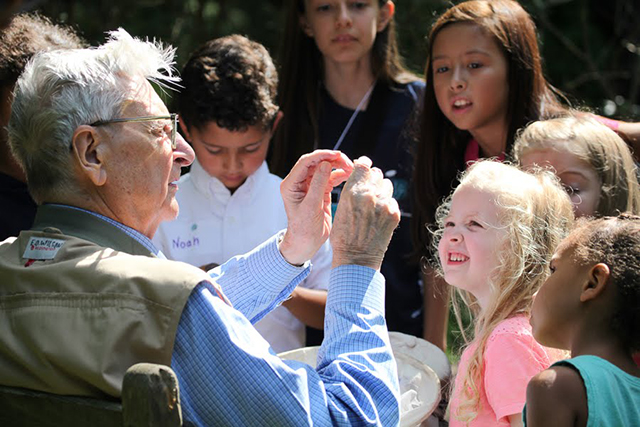

By Don Lyman
This article was originally published in the Boston Globe, July 17, 2019
Earlier this month, more than 100 scientists and naturalists, along with several hundred members of the public, converged on Concord to participate in the third Great Walden BioBlitz.
They also were there to celebrate the 90th birthday of renowned Harvard biologist E.O. Wilson, in recognition of his leadership in the research and conservation of biodiversity.
Participating scientists and naturalists spread out in a 5-mile radius around Walden Pond to see how many different species of plants, animals, and fungi they could find in a single day. They surveyed areas including Minute Man National Historical Park, Walden Pond State Reservation, Estabrook Woods, Great Meadows National Wildlife Refuge, and Drumlin Farm.
“We need to know what species there are, where they are, and what their condition is,” Wilson said. “Bioblitzes help to get biodiversity information quickly, so biodiversity maps can be drawn piece by piece.”
Wilson said the estimated rate of extinction now is about 1,000 times greater than before the coming of humanity, because of issues like climate change and habitat destruction.
The event was organized by the Walden Woods Project, in partnership with Minute Man National Historical Park, the E.O Wilson Biodiversity Foundation, and naturalist/author Peter Alden.
As of July 11, 1,082 species had been tallied from this year’s BioBlitz, according to Matt Burne, conservation director of the Walden Woods Project. The final species count won’t be completed for several weeks.
Early results included a plant species, Fallopia cilinodis, which had never before been recorded in Concord, said Burne. Walter Kittredge, a botanist and curatorial assistant at the Harvard University Herbaria, found the plant.
The first BioBlitz in Concord was on July 4, 1998, Alden said. The date was chosen because Henry David Thoreau moved into his cabin on Walden Pond on July 4, 1845, where he later wrote his iconic book, “Walden.”
“Since then, we’ve had a BioBlitz about every 10 years, honoring Henry David Thoreau,” Alden said.
“What he wrote about and labored on is the foundation for national parks,” said Kathi Anderson, executive director of the Walden Woods Project. “It’s important to go back to where this began. And it’s a wonderful way to get people involved.”
Jeff Corwin, naturalist and host of ABC television’s “Ocean Treks with Jeff Corwin,” was a guest speaker at the event. He said it’s increasingly important that young people, like his 10-year-old daughter, Marina, who accompanied him, make a connection with nature.
“You protect what you love, but you can’t love what you don’t know,” Corwin said in an interview. “We are losing many profound species in an unnatural way. The solution is the next generation of scientists and conservationists on the front lines. The next generation is our last chance to salvage what remains.”
Dominic Kemmett, a 21-year-old senior at Boston University who is studying biology, said the BioBlitz encouraged people to pay attention to the natural world around them.
Kemmett, whose primary area is herpetology, the study of reptiles and amphibians, said he had a great time hanging out with a bunch of like-minded people who had a little more breadth of natural history knowledge than he did.
“At the BioBlitz there were people stopping for flowers, birds, fungi,” Kemmett said.
Around noon, scientists and naturalists came in from the field to hear remarks from Wilson, Corwin, and others at a luncheon celebration of the biologist’s 90th birthday.
“I think one could argue that the seed of the American conservation movement was planted and germinated right here,” Corwin said. “And one could argue that germinating process created the root ball for the global conservation movement. Henry David Thoreau led to a John Muir, to an Aldo Leopold, to a Rachel Carson, to a Jane Goodall, to an E.O. Wilson.”
Wilson said his plan for saving the world’s biodiversity is to set aside half the planet, both land and ocean, as protected areas, an idea he put forth in his 2016 book, “Half Earth.” He estimates this would save about 85 percent of the earth’s species.
“One half for nature, and one half for us,” said Wilson, “so that both may survive in glory and peace.”
Wilson said his favorite natural environment is the Mobile-Tensaw River Delta in Alabama, where he lived as a boy. He’d like to see it become a national park.
“When I was a kid in Alabama I rode my bike out to the forest,” said Wilson. “It’s a magnificent riverine forest — the American Amazon — with a rich fauna and flora. I lived in that swampland.”
With regard to turning 90, Wilson said the milestone makes him want to hurry to achieve his goals.
“I’ve committed myself to undertake a thorough study of ecosystems,” said Wilson. “It seems like something worthy of doing in my 90s.”
Don Lyman is a biologist, freelance science journalist, and hospital pharmacist who lives north of Boston. Send your questions about nature and wildlife in the suburbs to donlymannature@gmail.com.

